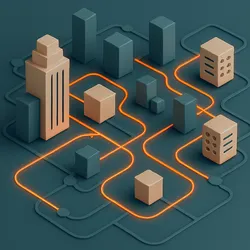Beyond Internet Dependency:
Designing for Resilience
Should we revert to offline solutions? It’s a misguided question—like asking whether we could live without electricity. The internet has reached similar indispensability. The real issues are distribution and resilience, not renunciation.
Today, it feels like everything requires an internet connection. Truly local processes are rare; even these often rely on remote data. How did we become so dependent?
But again, that’s the wrong line of thinking. The internet has taken on the same level of importance as electricity. Who would willingly give up power today? Because electricity is so vital, its infrastructure and production are designed accordingly. Yes, outages happen. There’s no such thing as 100% uptime. But overall, the system is remarkably stable. And in critical areas, backup power systems are in place to handle rare failure scenarios.
With the internet, however, some still question its omnipresence: Why must so much depend on it? But the logic is identical. The focus should be: How do we ensure services run continuously? The internet itself is rarely the problem—it’s usually the services being used. For large companies or factories, connectivity might also be an issue. Better questions, already being asked, include:
Critical Questions for a Hyperconnected Era
-
Single Points of Failure
- How reliant am I on one service? Could its failure halt my work or lock my data?
- Can a single provider restrict my daily life?
-
Data Sovereignty
- Is my data always accessible? Is it structured for unfettered access?
-
Connectivity Realism
- Must everything sync in real-time, or can asynchronous methods suffice?
-
Decentralization
- Can I distribute services/data to reduce outage risks?
- Could this eliminate centralized systems—or spawn more resilient architectures?
-
Redundancy
- Can critical connections use multiple pathways to ensure uptime?
Each of these questions could spark an entire series of articles. But these are the questions that truly matter today—not whether we’re “too dependent” on the internet.
The Local-First Blind Spot
Decentralization and local-first approaches have been neglected for decades. Dependencies weren’t accidental; they were designed. This isn’t inherently negative—if we acknowledge and mitigate the risks. This isn’t about blaming service providers. The issue is simpler: choosing a service creates dependence. And that realization often comes too late—during an outage, or worse, data loss.

